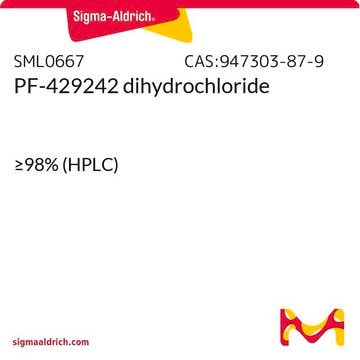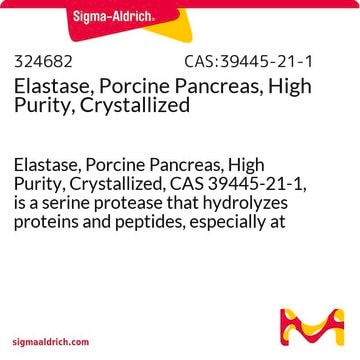569371
SREBP Processing Inhibitor, Betulin
The SREBP Processing Inhibitor, Betulin, also referenced under CAS 473-98-3, controls the biological activity of SCAP (SREBP cleavage activating protein). This small molecule/inhibitor is primarily used for Cell Signaling applications.
Sinónimos:
SREBP Processing Inhibitor, Betulin, Lup-20(29)-ene-3β,28-diol, Sterol Regulatory Element Binding Protein Processing Inhibitor, Betulin
About This Item
Productos recomendados
Nivel de calidad
Análisis
≥95% (NMR)
formulario
powder
fabricante / nombre comercial
Calbiochem®
condiciones de almacenamiento
OK to freeze
color
off-white
solubilidad
DMSO: 3.5 mg/mL
Condiciones de envío
wet ice
temp. de almacenamiento
2-8°C
InChI
1S/C30H50O2/c1-19(2)20-10-15-30(18-31)17-16-28(6)21(25(20)30)8-9-23-27(5)13-12-24(32)26(3,4)22(27)11-14-29(23,28)7/h20-25,31-32H,1,8-18H2,2-7H3/t20-,21+,22-,23+,24-,25+,27-,28+,29+,30+/m0/s1
Clave InChI
FVWJYYTZTCVBKE-ROUWMTJPSA-N
Descripción general
Advertencia
Otras notas
Información legal
Código de clase de almacenamiento
11 - Combustible Solids
Clase de riesgo para el agua (WGK)
WGK 3
Certificados de análisis (COA)
Busque Certificados de análisis (COA) introduciendo el número de lote del producto. Los números de lote se encuentran en la etiqueta del producto después de las palabras «Lot» o «Batch»
¿Ya tiene este producto?
Encuentre la documentación para los productos que ha comprado recientemente en la Biblioteca de documentos.
Nuestro equipo de científicos tiene experiencia en todas las áreas de investigación: Ciencias de la vida, Ciencia de los materiales, Síntesis química, Cromatografía, Analítica y muchas otras.
Póngase en contacto con el Servicio técnico







